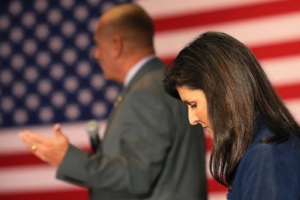Nikki Haley’s Résumé Is Perfect. It Might Not Matter.
Last month, I listened to my former colleagues on Slate’s “Political Gabfest” podcast discuss Nikki Haley after she declared her run for president. John Dickerson, also of CBS News, explained that in a pre-Donald Trump world, you could make a strong case about Haley’s credentials for the job:
“She comes from an important primary state. She has experience as a governor. She did well by the standards of the Republican Party as governor of South Carolina in terms of regulations and taxes. [She has] executive branch experience as ambassador to the U.N. She’s got a foreign policy piece — that’s, you know, that’s a pretty good place to start if you’re a Republican in the old days.”
But now, because the Republican Party continues to orbit the rogue planet of Trump, Dickerson explains, the path of a more traditional candidate is more complicated. “If you want this turf, you’ve got to grab it,” he said, but “that’s not her inclination.” Or as the journalist Rosie Gray has observed, Haley “probably isn’t the kind of candidate who can get through a Republican presidential primary. Shrewd as she has been, she can’t plausibly reinvent herself as a 2023 outrage merchant.”
I was thinking about this when I saw an Axios report this week that Trump is considering a female running mate and that he “sees Kari Lake as a model for his vice-presidential pick, according to people who discussed the topic with him.” Lake, you’ll recall, is a former TV anchor who’s never held elective office and who ran for governor of Arizona in 2022. She lost and has spent months contesting the election results without evidence to back her claims of voter fraud. My colleague Michael Bender described her as “a polished and ruthless communicator,” when he interviewed Lake in February.
She told him: “Here’s your headline: Kari Lake is on the warpath.”
Haley and Lake represent the principal archetypes for contemporary political candidates — Haley relies on her track record, and Lake is all bombast. Historically, the handful of women who’ve been credible candidates for national or statewide executive office occupied the former lane. Think: Hillary Clinton, Kamala Harris, Elizabeth Warren, Susana Martinez. (I didn’t realize just how few women had ever been governors: 49 in all of American history.)
For some women of color, there can be even fewer models of executive office success. For instance, there have been Black female lieutenant governors, but as The Times’s Jazmine Ulloa reported this week in an article headlined “More Black Women Run for Office, but Prospects Fade the Higher They Go,” no state has had a Black female governor. While Harris broke several glass ceilings as the first female, Black and Asian American vice president, she is, according to a recent Times analysis, “struggling to carve out a lane for herself,” and many doubt her prospects as a future leader of the country.
Running in the charisma lane — Sarah Palin’s rise is a good example — doesn’t seem to work as well for women running nationally, because they can more easily be dismissed as unserious. Palin had more political experience than Trump or Lake when she ran for vice president, but it’s also noteworthy that several years after she resigned as governor of Alaska, she couldn’t even win a congressional race in her home state, despite once having been quite popular there and having been, by many accounts, a precursor to Trump. (To be clear: In my ideal world, neither Palin nor Trump nor Lake would get anywhere near the White House — not again, at least. And while I think Haley’s résumé is solid, we’re not remotely ideologically aligned. But we don’t live in my ideal world; we live in a world where our former president publicly declares, “I am your retribution,” like a video game villain and his supporters cheer.)
If the experience lane is blocked for women, too, however, there’s nowhere for them to run.
I ran this theory by Jennifer Lawless, a professor of politics and public policy at the University of Virginia. She told me that while she doesn’t disagree with the premise, we might not even have enough inexperienced female candidates running to know whether pure charisma works for them. “The perception among female candidates is that they need to be more qualified, but there’s not much evidence that voters are holding them to a higher bar. At the same time, voters are not frequently presented with unqualified female candidates,” she told me over the phone.
Over two decades of research, Lawless has found that at this point, female candidates perform just as well as male candidates in terms of winning elections and raising money. Where they’re still far behind is in what she calls “political ambition,” or the desire to run for office. Since 2001, Lawless has been polling citizens “with the four professional backgrounds most common among elected officials (law, business, education and politics),” and found that the gender gap in political ambition has actually grown by two percentage points since the early aughts: In 2001, 59 percent of these men considered running for office, compared to 43 percent of women. In 2021, the percentage of men remained at 59 percent, but the percentage of women dropped to 41 percent.
“Women aren’t only less likely than men to have considered running for office,” write Lawless and her colleague, the political scientist Richard Fox. “They are also less likely to express any interest in a candidacy at some point down the road.” Interestingly, the gender gap in political ambition is about the same for white women and women of color.
